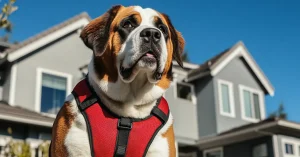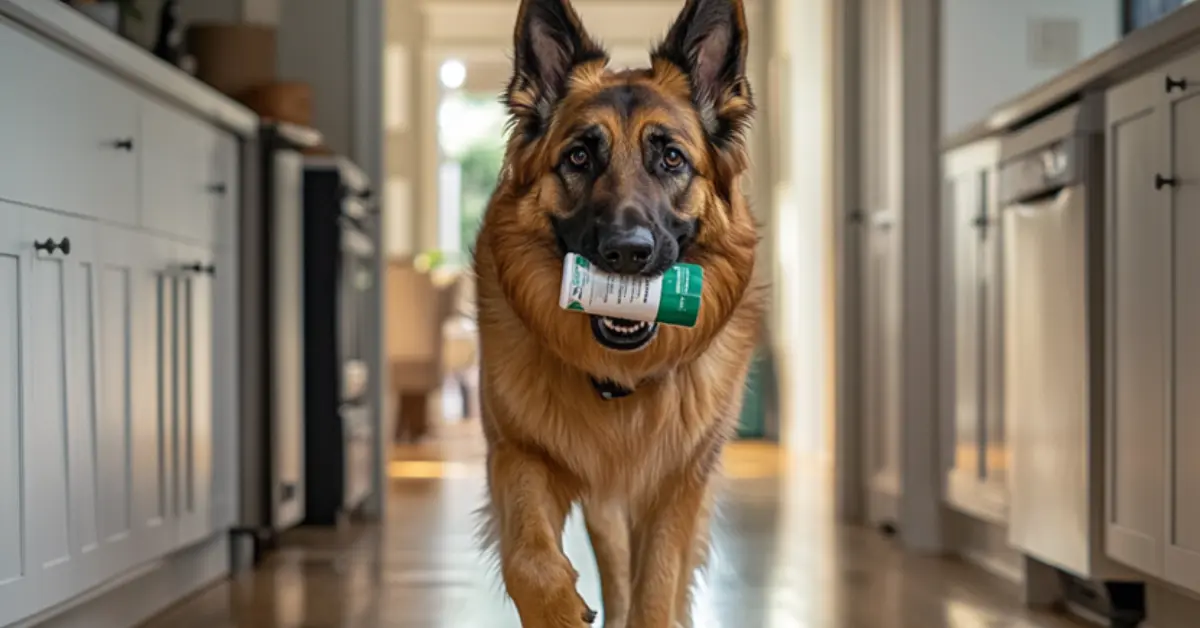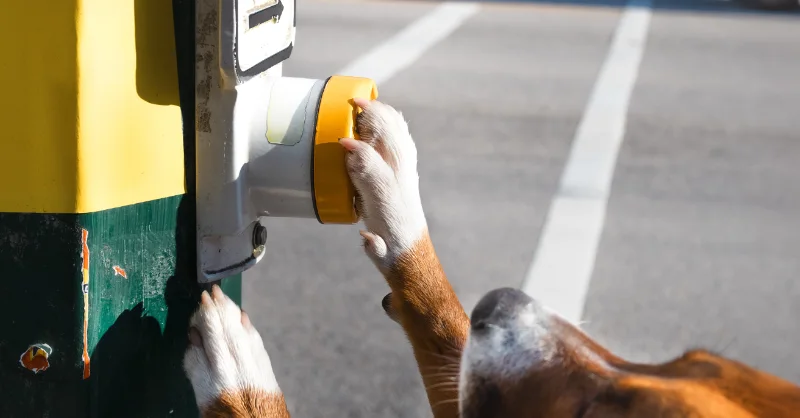Home Page › Blog › Hearing Dogs for the Deaf
Hearing Dogs for the Deaf

Canines are very smart, even though their goofy grins and tail-wagging may distract from their intelligence. Service dogs, in particular, show their intelligence by performing tasks that help people with disabilities manage their daily lives. These unique tasks include detecting a person’s blood sugar through smell, helping retrieve life-saving medication, and helping visually impaired people navigate busy streets. One essential function that a service dog can do is to be the ears for its handler who is hearing impaired. This category of service dogs is called hearing dogs.
What Do Hearing Dogs Do?
According to the National Institutes of Health, about 15% of adults in the U.S. have some hearing impairment. Adults 60–69 have the highest rates of hearing loss. The Better Hearing Institute states that hearing loss can affect household income, costing up to $12,000 each year. People who don’t receive treatment or adequate assistance for their hearing loss are twice as likely to be depressed than those with no hearing problems.
The World Health Organization defines deafness as “having profound hearing loss, which implies very little or no hearing.” For people who are deaf, having a service dog provides a direct link to the world around them. Hearing dogs can alert their handlers in various situations:
- Kitchen help: update its hander of the status of oven timers, coffee makers, and kettles
- Communication: let their handler know when telephones and doorbells ring
- Child care: fetch their handler when their babies’ calls or cries
- Dangers: alert their handler of smoke or fire alarms
- Street safety: make their handler aware of oncoming traffic

Where Can I Get a Hearing Dog?
A hearing dog may be purchased through a reputable service dog organization, or you may train the service dog on your own. Hearing dogs, like all service dogs, are an expensive investment and can cost over $20,000. The cost depends on the organization and whether an individual qualifies for a price reduction. The following are organizations that specialize in connecting trained hearing service dogs to the right homes:
NEADS

NEADS provides service dogs free of cost as the client agrees to fundraise $8,000, using the help of NEADS fundraising resources. NEADS offers service dogs for children, veterans, and the hearing impaired.
International Hearing Dogs, Inc.

International Hearing Dogs, Inc. provides service dogs at no cost to clients. Although their dogs cost about $15,000 to house, train, and place, their fees are covered through donations.
Canine Companions for Independence

Canine Companions for Independence provide hearing dogs free of charge for people who apply and qualify. Their dogs are Labrador and Golden Retrievers that are specially trained to be service dogs.
The Hearing Dog Program

The Hearing Dog Program works diligently to match handlers to their ideal dog. Dogs are awarded to qualified applicants at no cost, though recipients are responsible for grooming costs and care.
How Do I Train a Hearing Dog?
Though many organizations offer hearing dogs to qualified people for free or a nominal fee, there aren’t many dogs available. You may fall on a waiting list, or you may not qualify. If you find the cost of buying a hearing dog is too high for your budget, you always have the option of training a hearing dog yourself.
First, you need to determine what breed or size of dog best meets your lifestyle and needs. Then you would find a dog that has the right temperament and traits for a service dog. Several months of audio-response and public-access training follow, documenting training progress in a service dog training log. This training may encompass everything from typical sit-stay commands to alerting their handler of knocks on doors and smoke alarms. Training takes time and patience, which isn’t always for everyone. If you have the time and inclination — and possibly someone to help — self-training may prove to be the most cost-effective option.
How Do You Qualify?
For most hearing service dog agencies, applicants must meet a set of qualifications to receive a service dog, even if you pay for one full-price. These qualifications ensure that the dogs are successful at what they do and don’t pose a danger to others. Here are a few standard qualification requirements. Applicants must be:
- 18 years or older
- Have moderate to severe hearing loss
- Be able to participate in the training process
- Meet the financial and physical requirements to have a service dog
- Not have other dogs in the home
Qualifying for a hearing service dog typically requires a diagnosis and assessment by a physician or audiologist. Having documentation available prior to starting your applications ensures that you are prepared and makes the process less intimidating. Keep in mind that organizations receive hundreds of applications, and a response may take time. Remember to politely follow up if you have any inquiries regarding the status of your application. Obtaining a service dog takes time and effort but is worth the wait.
About the Author: The writing team at Service Dog Certifications is made up of folks who really know their stuff when it comes to disability laws and assistance animals. Many of our writers and editors have service dogs themselves and share insights from their own experiences. All of us have a passion for disability rights and animals.
10 comments
Leave a Reply Cancel reply
Latest Posts

The Fair Housing Act Explained for Assistance Animal Owners
The Fair Housing Act (FHA) is a federal law in the United States that prohibits discrimination against people who need a support animal for their physical or mental health. The FHA applies to landlords in all 50 states. Under the Fair Housing Act, if you need a service dog or an emotional support animal, your […]

Read More

How a Service Dog Knows When It’s Time For You to Take Medicine
Service dogs can help their handlers by reminding them to take medication. These highly trained dogs know when it’s time for their handler to take medicine through routine recognition, alarm responses, scent detection, and awareness of physical and behavioral cues. Training a service dog to do this is one of the many service dog tasks […]

Read More

The Ultimate Guide to Service Dog Tasks: A Comprehensive List by Disability
Service dogs are remarkable animals trained to assist individuals with disabilities by performing various tasks. According to the Americans with Disabilities Act (ADA), a dog can become a service dog if it has been trained to perform a task that helps with the handler’s health condition. Service dogs can help with physical disabilities as well […]

Read More







My dog is already trained to tell me or show me to stop if I don’t hear. He pulls me backward at any danger, tells hus auntie if Ive slept too long which is prolly what most dogs do. He knows our grocery store and where to go and stays in bath with me in case of fall. Sleeps woth me and wakes up for our medication and when we walk, he walks me tenderly and knows where to go in our community. Knows when I speak and listens and minds. Does so much more, but it would be a long list. How do I apply?
There is no “application” process to get a service dog. In order to have a service dog, you must have a disability (a healthcare professional can help determine if you meet this criteria) and the service dog must be trained to perform a job or task that assists with that disability.
I want to train dog to assist my hard of hearing husband. Where I can go for training?
Unfortunately our services and products are for existing fully qualified service dog owners. We do not provide training or adoption referrals. You can read more about service dog training however at this link: https://www.servicedogcertifications.org/public-access-test-service-animals/
Hi
I was born deaf, profound loss, and do wear hearing aids. I’ve always had a dog for night security. But now I need to move into an apartment and in order for them to accept my dog I need some sort of paperwork for proof to use as Hearing/Deaf Service Dog. How do I go about getting this done? Please help!!
Thanks!!
You do not need any form of paperwork to prove you have a service dog. To verify you have a service dog, you must be able to answer two questions for your housing provider: 1. Is the dog required because of a disability? and 2. What work or task has the dog been trained to perform?
Hi I was born with a Hearing deficit and I am deaf in one ear.
My children are all grown up and moved out of the home and I live alone and would benefit from a service dog that can help keep me Safe and alert me when the doorbell rings or my phone rings or if a package is at my door. How Can I be matched with a service dog for free?
Unfortunately we do not provide referrals for service dog adoptions, as our services are for already qualified service dog owners. We wish you the best of luck in your journey!
Is a border Collie a good breed to be trained as a hearing lost service dog?
If you’re unsure about whether a particular dog has the right attributes to serve as your service dog, we recommend speaking to a professional trainer.